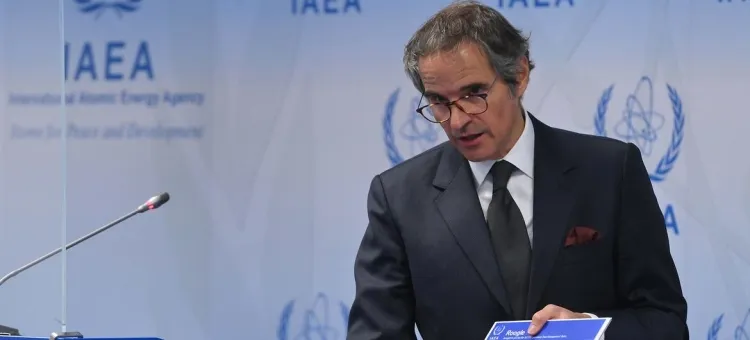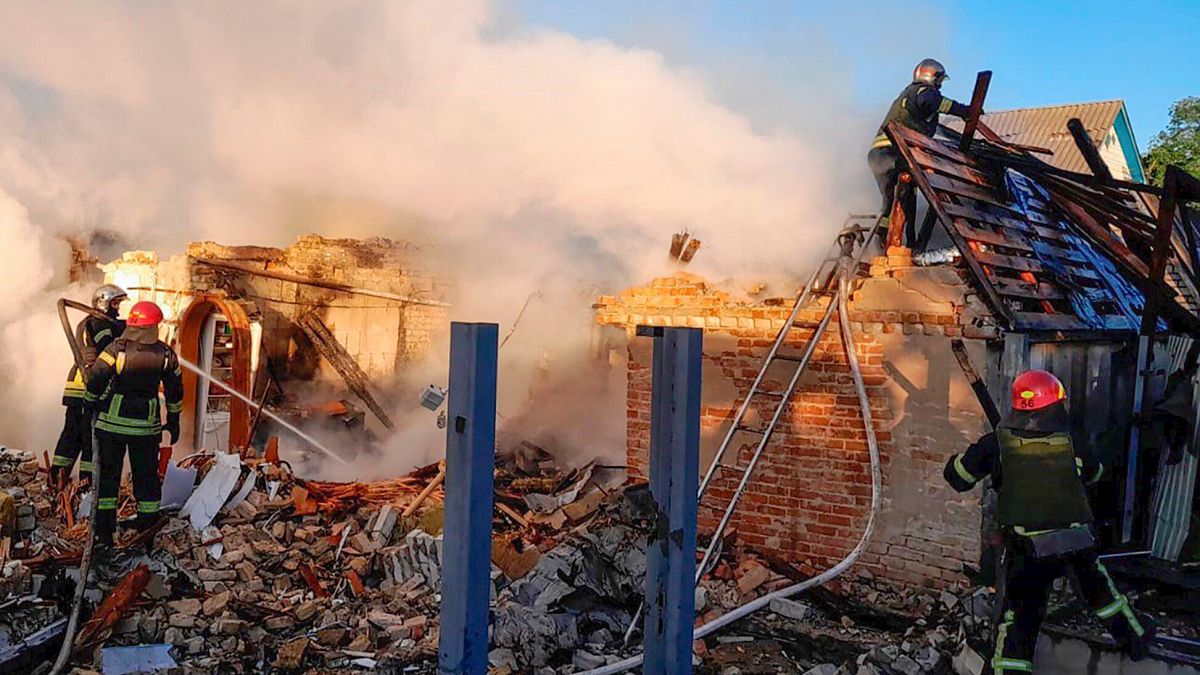IAEA Chief Warns of Nuclear Risks Amid Russia’s Renewed Attacks on Ukraine's Power Grid
Russia’s recent escalation of attacks on Ukraine’s infrastructure, particularly its energy grid, has intensified concerns over the safety of the country’s nuclear facilities. The International Atomic Energy Agency (IAEA) Chief, Rafael Grossi, arrived in Kyiv on Tuesday to assess the potential risks posed by these renewed assaults.

The visit comes as Russia continues its relentless campaign against Ukraine's power infrastructure, leaving the country more reliant than ever on nuclear energy to meet its electricity needs. Grossi’s inspection of a key electricity distribution substation highlighted the critical role of Ukraine’s power grid in maintaining the safe operation of its nuclear power plants, which are essential to the country’s energy security.
The Growing Nuclear Safety Concerns
Ukraine’s energy grid has been under severe strain following two years of intense Russian bombardment. As the conflict drags on, Ukraine has become increasingly dependent on nuclear power for more than half of its electricity generation. The situation has led to significant international concern, especially given the high-stakes nature of operating nuclear plants in a conflict zone. The IAEA’s Grossi, visiting a key substation in the Ukrainian capital, underscored the gravity of the situation, pointing out that disruptions to the power grid could trigger a nuclear accident. This warning is particularly pertinent given the strategic importance of the substation in transmitting electricity from two nuclear power plants—Rivne and Khmelnitsky—back into the grid.
The focus of Grossi’s visit was to evaluate the current state of Ukraine’s energy infrastructure, particularly its vulnerability to attacks that could compromise nuclear safety. He specifically chose the Pitka substation due to its importance in connecting the power plants to the broader Ukrainian grid. The vulnerability of such substations is heightened by the ongoing Russian attacks on Ukraine’s energy infrastructure, which have left parts of the country’s power grid inoperable or severely damaged.
Russia's Intensified Attacks on Ukrainian Civilians and Infrastructure
In addition to the threats to Ukraine's nuclear facilities, Russia’s recent attacks on civilian infrastructure have sparked global outrage. On Tuesday, Russian strikes targeted the northeastern Ukrainian city of Izium, killing at least five civilians and injuring over 50 others. The attacks also destroyed the city council building, further exacerbating the destruction in this already war-torn region. Izium, located just 40 kilometers from the front lines, has become a flashpoint in the ongoing conflict as Russian forces continue to employ ballistic missiles to strike civilian areas, disregarding international law that prohibits attacks on non-military targets.

Ukrainian President Volodymyr Zelensky condemned the attack, calling it an example of the “impossible cruelty” of the Russian forces. He further urged Ukraine's allies to increase diplomatic and military pressure on Moscow to halt its invasion. Zelensky’s comments reflect the growing frustration in Kyiv, as the war continues to take a devastating toll on the civilian population and critical infrastructure.
Moscow has repeatedly denied targeting residential areas, maintaining that its military strikes are aimed at Ukrainian military installations and infrastructure. However, the widespread destruction of civilian buildings and the loss of innocent lives have cast doubt on Russia’s claims and prompted renewed calls for accountability on the international stage.
The International Response and Calls for Action
The international community remains deeply concerned about the situation in Ukraine, particularly the potential risks to nuclear safety. The IAEA’s visit to Kyiv signals the urgency of the situation, as the agency seeks to monitor and assess the safety of Ukraine’s nuclear facilities in light of the ongoing conflict. With both sides in the war entrenched in their positions, the threat of an accident at one of Ukraine’s nuclear plants is a growing concern, especially as Russian attacks continue to target critical infrastructure, including power lines and substations.
As Ukraine’s dependence on nuclear energy increases, the need for international cooperation to ensure the safety of its nuclear plants becomes even more critical. The IAEA, along with other international bodies, will likely play an increasingly important role in facilitating communication between Ukraine and the global community, ensuring that nuclear safety remains a top priority amid the ongoing conflict.
At the same time, Ukraine continues to call for greater support from its international allies, both in terms of military assistance to defend against Russian aggression and diplomatic pressure to force Russia to negotiate a peaceful resolution to the war. The humanitarian crisis caused by Russia’s attacks on civilian infrastructure, including power plants, has prompted calls for stronger sanctions and increased efforts to bring an end to the war.
The Humanitarian Impact of Russia’s Attacks
The humanitarian impact of Russia’s attacks on Ukraine’s power grid and civilian infrastructure cannot be overstated. The destruction of homes, hospitals, schools, and essential public buildings has displaced thousands of families, leaving many without basic necessities such as electricity, water, and heating. With winter approaching, the situation is expected to worsen, especially for those in areas heavily affected by Russian strikes. The ongoing power shortages and disruptions to essential services have further strained an already overburdened healthcare system, with hospitals struggling to operate without reliable electricity.
The United Nations and various humanitarian organizations have called on Russia to cease its attacks on civilian infrastructure, emphasizing that such actions violate international law. However, as the war grinds on, the international community’s ability to influence Russia’s military strategy remains limited, and Ukraine continues to bear the brunt of the conflict’s devastating consequences.
Conclusion: A Dire Need for Action
As the war between Russia and Ukraine continues, the risks to both civilian life and nuclear safety grow ever more pressing. The IAEA’s visit to Kyiv and its warnings about the vulnerabilities of Ukraine’s power grid underscore the importance of international cooperation to ensure the protection of Ukraine’s nuclear facilities. With Russia’s attacks intensifying, the need for greater diplomatic and military support for Ukraine is clearer than ever.
For Ukraine, the path forward remains fraught with challenges, but the country’s resolve to defend its sovereignty and protect its citizens remains unwavering. As the international community grapples with how best to address the ongoing crisis, the focus must remain on preventing further escalation, safeguarding nuclear safety, and providing humanitarian aid to those most affected by the conflict.
What's Your Reaction?
















